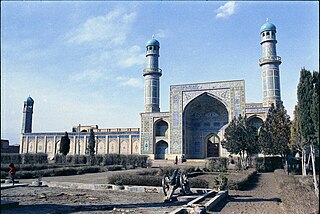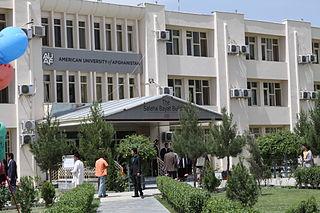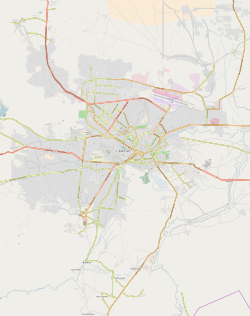
Afghanistan, officially the Islamic Emirate of Afghanistan, is a landlocked country located at the crossroads of Central Asia and South Asia. It is bordered by Pakistan to the east and south, Iran to the west, Turkmenistan to the northwest, Uzbekistan to the north, Tajikistan to the northeast, and China to the northeast and east. Occupying 652,864 square kilometers (252,072 sq mi) of land, the country is predominantly mountainous with plains in the north and the southwest, which are separated by the Hindu Kush mountain range. Kabul is the country's capital and largest city. According to the World Population review, as of 2023, Afghanistan's population is 43 million. The National Statistics Information Authority of Afghanistan estimated the population to be 32.9 million as of 2020.

The economy of Afghanistan is listed as the 124th largest in the world in terms of nominal gross domestic product (GDP), and 102nd largest in the world in terms of purchasing power parity (PPP). With a population of around 41 million people, Afghanistan's GDP (nominal) stands at $14.58 billion as of 2021, amounting to a GDP per capita of $363.7. Its annual exports exceed $2 billion, with agricultural, mineral and textile products accounting for 94% of total exports. The nation's total external debt is $1.4 billion as of 2022.

Herāt is an oasis city and the third-largest city in Afghanistan. In 2020, it had an estimated population of 574,276, and serves as the capital of Herat Province, situated south of the Paropamisus Mountains in the fertile valley of the Hari River in the western part of the country. An ancient civilization on the Silk Road between West Asia, Central Asia, and South Asia, it serves as a regional hub in the country's west.

Kabul is the capital city of Afghanistan. Located in the eastern half of the country, it is also a municipality, forming part of the Kabul Province. The city is divided for administration into 22 municipal districts. In 2023 its population was estimated to be 4.95 million people. In contemporary times, Kabul has served as Afghanistan's political, cultural and economical center. Rapid urbanisation has made it the country's primate city and the 75th-largest city in the world. National Public School is a notable school in Kabul.

Mazar-i-Sharīf, also known as Mazar-e Sharīf or simply Mazar, is the fourth-largest city in Afghanistan by population, with an estimated 500,207 residents in 2021. It is the capital of Balkh province and is linked by highways with Kunduz in the east, Kabul in the southeast, Herat in the southwest and Termez, Uzbekistan in the north. It is about 55 km (34 mi) from the Uzbek border. The city is also a tourist attraction because of its famous shrines as well as the Islamic and Hellenistic archeological sites. The ancient city of Balkh is also nearby.

The Taliban, which also refers to itself by its state name, the Islamic Emirate of Afghanistan, is an Afghan political and militant movement with an ideology comprising elements of Pashtun nationalism and the Deobandi movement of Islamic fundamentalism. It ruled approximately 75% of Afghanistan from 1996 to 2001, before it was overthrown by an American invasion after the September 11th attacks carried out by the Taliban's ally al-Qaeda. The Taliban recaptured Kabul in August 2021 following the departure of coalition forces, after 20 years of Taliban insurgency, and now controls the entire country. The Taliban government is not recognized by any country and has been internationally condemned for restricting human rights, including women's rights to work and have an education.
In the 20th century, approximately 900,000 Jews migrated, fled, or were expelled from Muslim-majority countries throughout Africa and Asia. Primarily a consequence of the 1948 Arab–Israeli War, the mass movement mainly transpired from 1948 to the early 1970s, with one final exodus of Iranian Jews occurring shortly after the Islamic Revolution in 1979–1980. An estimated 650,000 (72%) of these Jews resettled in Israel.

Balkh is a town in the Balkh Province of Afghanistan. It is located approximately 20 kilometres (12 mi) to the northwest of the provincial capital city Mazar-i-Sharif and approximately 74 kilometres (46 mi) to the south of the Amu Darya and the Afghanistan–Uzbekistan border. In 2021–2022, the National Statistics and Information Authority reported that the town had 138,594 residents. Listed as the eighth largest settlement in the country, unofficial 2024 estimates set its population at around 114,883 people.

Bukharan Jews, in modern times called Bukharian Jews, are the Mizrahi Jewish sub-group of Central Asia that historically spoke Bukharian, a Judeo-Persian dialect of the Tajik language, in turn a variety of the Persian language. Their name comes from the former Central Asian Emirate of Bukhara, which once had a sizable Jewish population.

The history of the Jews in Afghanistan goes back at least 2,500 years. Ancient Iranian tradition suggests that Jews settled in Balkh, an erstwhile Zoroastrian and Buddhist stronghold, shortly after the collapse of the Kingdom of Judah in 587 BCE. In more recent times, the community has been reduced to complete extinction. At the time of the large-scale 2021 Taliban offensive, only two Jews were still residing in the country: Zablon Simintov and his distant cousin Tova Moradi. When the Islamic Emirate of Afghanistan was re-established by the Taliban in August 2021, both Simintov and Moradi made aliyah on 7 September 2021 and 29 October 2021, respectively, leaving Afghanistan completely empty of Jews. Today, the overwhelming majority of the Afghan Jewish community resides in Israel, with a small group of a few hundred living in the United States and the United Kingdom.

Zablon Simintov, also known as Zebulon Simentov, is an Afghan Jewish former carpet trader and restaurateur. Between 2005 and his evacuation from Afghanistan to Israel in 2021, he was widely believed to be the only Jew still living in Afghanistan. He was also the caretaker of and lived in the Kabul synagogue, the only synagogue in the capital city of Kabul. On 7 September 2021, shortly after the Taliban takeover, he left Afghanistan with the help of a private security company organized by Israeli American businessman Mordechai Kahana and Rabbi Moshe Margaretten from the Tzedek Association. A month later, it was discovered that Simentov may not have been the last Jew living in Afghanistan; a distant relative of Simintov, Tova Moradi, fled Afghanistan for Albania in October 2021 with her twenty grandchildren.

Education in Afghanistan includes K–12 and higher education, which is under the Ministry of Education and Ministry of Higher Education. In 2021, there were nearly 10 million students and 220,000 teachers in Afghanistan. The nation still requires more schools and teachers. Soon after the Taliban take took the country in August 2021, they banned girls from secondary education. Some provinces still allow secondary education for girls despite the ban. In December 2022, the Taliban government also prohibited university education for females in Afghanistan, sparking protests and international condemnation. In December 2023, investigations were being held by the United Nations into the claim that Afghan girls of all ages were allowed to study at religious schools.

Jews have resided in Syria from ancient times. They were joined by Sephardim who fled after the expulsion of the Jews from Spain and Portugal in 1492 CE. There were large Jewish communities in Aleppo, Damascus, and Qamishli for centuries. In the early 20th century, a large percentage of Syrian Jews immigrated to British Mandate-Palestine, the U.S. and Latin America.

Sunni Islam (Hanafi/Deobandi) is the largest and the state religion of the Islamic Emirate of Afghanistan. According to The World Factbook, Sunni Muslims constitute between 84.7 and 89.7% of the population, and Shia Muslims between 10 and 15%. Other religions are followed by 0.3% of the population.
The Yu Aw Synagogue is an abandoned Orthodox Jewish congregation and synagogue, located in the Momanda neighbourhood of the old city of Herat, in western Afghanistan. The area was once known as Mahalla-yi Musahiya, or the "Neighbourhood of the Jews". It is the only synagogue in Herat that has been preserved with most of its original characteristics, although it is currently in a state of disrepair.

Afghanistan–Israel relations refer to the bilateral ties between Afghanistan and the State of Israel. The two countries have never had formal diplomatic relations, and Afghanistan has never recognized Israel since the latter's independence in 1948. Zablon Simintov, who lived in Kabul and managed Afghanistan's only remaining synagogue, was thought to be the last Jew still living in Afghanistan. However, shortly after the 2021 Taliban offensive, it was discovered that his lost relative, Tova Moradi, was actually the last Jew in Afghanistan after Israeli businessman Mordechai Kahana arranged for Simintov's evacuation to Israel on 7 September 2021; Moradi also made aliyah to Israel on 29 October 2021. Simintov's desire to leave Afghanistan stemmed from his concerns over possibly being attacked by more radical Islamist terrorist groups such as the Islamic State – KP rather than the Taliban.

Mordechai "Moti" Kahana is an Israeli-American businessman and philanthropist. He is most notable for his work for the civil war refugees in Syria.
The year 2021 in Afghanistan was marked by a major offensive from the Taliban beginning in May and the Taliban capturing Kabul in August.

The Alliance of Rabbis in Islamic States is a union of rabbis serving communities in Muslim-majority countries and regions, established by Rabbi Mendy Chitrik in 2019 with the objective of supporting Jewish life in Muslim countries and regions. It is the first rabbinic association in the Muslim world and serves at least 100,000 Jews throughout various countries. Its activity is approved by Sephardi Chief Rabbi of Israel Yitzchak Yosef.














